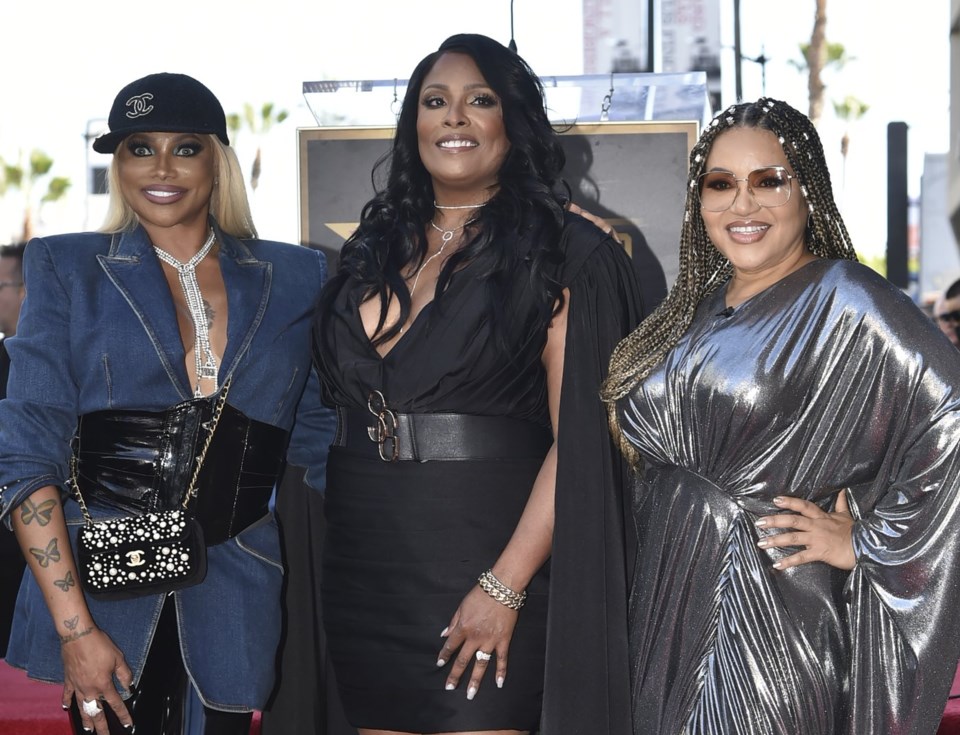Salt-N-Pepa are telling their record label not to push it as they fight for the rights to their music.
The groundbreaking duo behind hip-hop classics including 1993's “Shoop” and 1987's “Push It” say in a lawsuit that Universal Music Group is violating copyright law by refusing to agree to turn over the rights to their master recordings.
Cheryl “Salt” James and Sandra “Pepa” Denton filed the lawsuit in federal court in New York on Monday asserting that the copyright act of 1976, which says that after several decades artists can terminate previous agreements and reclaim ownership of their recordings, clearly now applies to them.
The fight, which has led to UMG pulling Salt-N-Pepa's music from streaming services, comes as many artists with beloved legacies are making lucrative sales of their catalogs, while others get stuck in classic record-label battles over old contracts.
“UMG has indicated that it will hold Plaintiffs’ rights hostage even if it means tanking the value of Plaintiffs’ music catalogue and depriving their fans of access to their work,” the suit says.
UMG representatives did not immediately respond to an email seeking comment.
The lawsuit suggests that situations like Salt-N-Pepa's are the very reason the provision of the copyright act exists. It allows artists who made deals “at the beginning of their careers” when they were relatively powerless to use the cultural standing and musical legacy they later established.
The suit says James and Denton filed to terminate their agreement under the law in 2022, “eager to retake full ownership of their art and legacy,” but that, “Inexplicably, UMG has refused to honor” their rights.
James and Denton say that by law, they should now be able to own early recordings including those from their 1986 debut album, “Hot, Cool & Vicious,” and 1987's “Push It,” a B-side whose remix caught on and became their breakthrough hit.
They say other recordings should legally be theirs later this year and in 2026, including the 1993 album “Very Necessary,” which includes “Shoop” and “Whatta Man.”
The duo is seeking both actual damages for money lost and punitive damages in amounts to be determined for UMG’s actions. The suit says actual damages could “well exceed $1 million.” They also want a permanent injunction confirming their rights to the recordings.
They said by pulling the songs from streaming and other commercial platforms, the label has “maliciously punished” Salt-N-Pepa “for daring to assert their rights.”
The label's lawyers said in letters included as exhibits in the lawsuit that they have encouraged mediation and want to reach a “mutually acceptable resolution.”
But the UMG lawyers said in the letters that James and Denton were not even personally parties in the 1986 agreement that covered their initial albums, and there is no evidence that they granted the label copyright that they can now reclaim.
UMG maintains that the recordings were “works made for hire,” which would not allow for the reclaiming of rights. Salt-N-Pepa's lawsuit says the women's agreements with the label make it very clear that they were not.
The Queens, New York, duo of James and Denton became Salt-N-Pepa in 1985. They were later joined by DJ Spinderella, who was not part of the early agreements under dispute and is not involved in the lawsuit.
“Salt-N-Pepa boldly changed the look of rap and hip-hop,” the lawsuit says. “They were not afraid to talk about sex and to share their thoughts about men. Their sound recordings ‘Let’s Talk About Sex’ and ‘None of Your Business,’ for example, were huge hits. They talked candidly about women’s sexuality and empowerment when such topics were frowned upon, heavily criticized, and called taboo.”
In 1995 they became the first female rap group to win a Grammy, and in 2021, they received a Grammy lifetime achievement award.
Later this year they'll become members of the Rock & Roll Hall of Fame when they receive the organization's Musical Influence Award.
___
AP Music Writer Maria Sherman contributed to this report.
Andrew Dalton, The Associated Press



